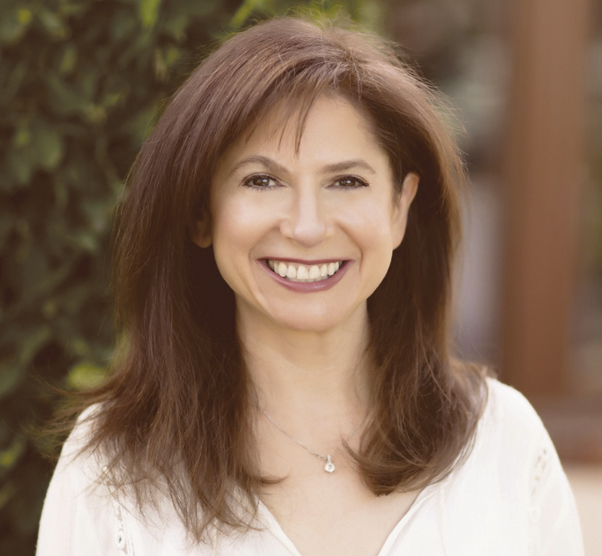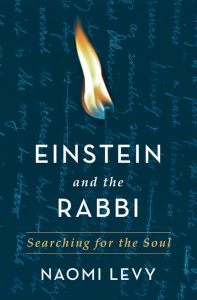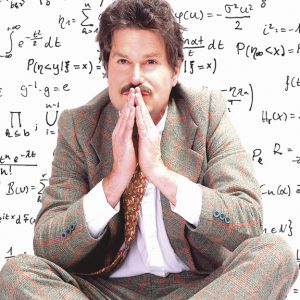Rabbi Naomi Levy: tending the soul

By Judy Bolton-Fasman, JewishBoston.com
In her new book, Einstein and the Rabbi: Searching for the Soul, Rabbi Naomi Levy teaches that the soul operates in our world on three levels — nefesh, ruach, and nishama.
While each of these three words is a Hebrew synonym for “soul,” Levy describes nefesh as the first level of spirituality. It’s the place we journey from to see the soul more expansively, to see our lives with more openness.
Ruach, she says, starts to teach us about our connections to the world, connections that include love and intimacy.
Nishama, the third level of the soul, is like heat: one can feel it, but not see it.
“It’s the part of us that is capable of prophetic vision,” Levy says. “It is what Albert Einstein was discussing (in his letter to Rabbi Robert Marcus) when he referred to the unity of all things and the delusion of separateness.
Einstein was saying that there is nothing but God. Everything I touch and see is only God.”
Levy will discuss Einstein and the Rabbi on Oct. 30 as part of the JCC’s Cultural Arts & Book Fest.
 The idea of writing about Einstein came to Levy after she read a snippet of a letter he had written to Marcus, an army chaplain among the first Americans to liberate Buchenwald.
The idea of writing about Einstein came to Levy after she read a snippet of a letter he had written to Marcus, an army chaplain among the first Americans to liberate Buchenwald.
After the war, Marcus escorted survivor children to an orphanage in France and a kibbutz in Israel. Initially, Levy didn’t know that Marcus was a grieving father who reached out to Einstein for succor.
She began to ponder why he wrote to Einstein.
“In Marcus’ mind, Einstein was the man who most understood the workings of God’s universe,” she opines. “Einstein was the man who transformed the way we understand the universe, time, space and matter. I couldn’t believe Einstein had written something so deeply spiritual. Here is a man who spent his life trying to prove the unified field theory — that everything is connected.”
This sent Levy on a scavenger hunt for Marcus’ original letter to Einstein.
Levy says she always wanted to be a rabbi. “It was part of my DNA.”
Her faith, however, was deeply challenged at the age of 15 when her father was murdered in a mugging in Brooklyn. She struggled to pray. “Many days, I couldn’t recite certain prayers because they seemed like lies.”
In college she decided the way she understood God was incorrect, that God’s job description is not to prevent evil in the world.
“We only start asking questions like ‘God, where were you?’ after we experience a trauma,” Levy says. “We should ask that question every day. If we do, instead of being angry with God, we can see God through new eyes.”
Her faith deepened and strengthened. “Instead of hating, I started listening,” she says. “As soon as I did that, I returned to my childhood dreams of being a rabbi.”
Returning to God is the centerpiece of Levy’s rabbinate. She leads a congregation in the Los Angeles area called Nashuva, which in Hebrew means, “We shall return.”
Her previous books present disenfranchised Jews with a more accessible Judaism.
“I’ve always been drawn to Jewish outsiders,” she says. “Nashuva came about as a desire to create something to draw Jews back to Judaism, to create something spiritual, soulful and musical. Some of the prayers we say, many of them written by me, were inspired by traditional liturgy.”
Levy’s faith was tested again a few years ago when she received a cancer diagnosis.
She had gone to the doctor with what she thought would be the simple removal of a small basal carcinoma on her nose. The cancer turned out to be pervasive, and Levy had to have major reconstructive surgery.
With that trauma came a disorienting role reversal in which she desperately needed the prayers she had recited over so many other people as a rabbi.
“As I used my own prayers, I realized that me from the past was here to comfort the me in the present,” she said. “I remember saying the verse from Hallel, ‘I called to God from my narrowness, and God answered from a vast expanse.’ I recited it over and over until I had reached a place of grace.”
Levy hopes to shed light on the connections between science and religion, theory and spirituality. After all, it was Einstein who declared, “Science without religion is lame; religion without science is blind.”
The JCC’s Cultural Arts & Book Fest presents author Rabbi Naomi Levy at 7 p.m. on Monday, Oct. 30 at the Boonshoft CJCE, 525 Versailles Dr., Centerville. $5 in advance, $8 at the door. R.S.V.P. to 610-1555 or at jewishdayton.org.
One-man play about Einstein

Along with Rabbi Naomi Levy, another Los Angeles presenter will contribute to the JCC Cultural Arts & Book Fest’s celebration of Albert Einstein’s genius. Actor and educator Jack Fry will perform his one-person show Einstein! at 7 p.m. on Thursday, Oct. 19 at Oakwood High School Auditorium, 1200 Far Hills Ave.
Einstein! is set in 1914 Berlin, with the scientist staring down professional and personal crises while working through his Theory of Relativity.
Fry has also taught full time in the Los Angeles Unified School District since 1990.
Tickets are $18 in advance, $25 at the door, free for ages 18 and under. According to the JCC, the show is appropriate for ages 10 and up. R.S.V.P. to 610-1555 or at jewishdayton.org. — Marshall Weiss
To read the complete October 2017 Dayton Jewish Observer, click here.

